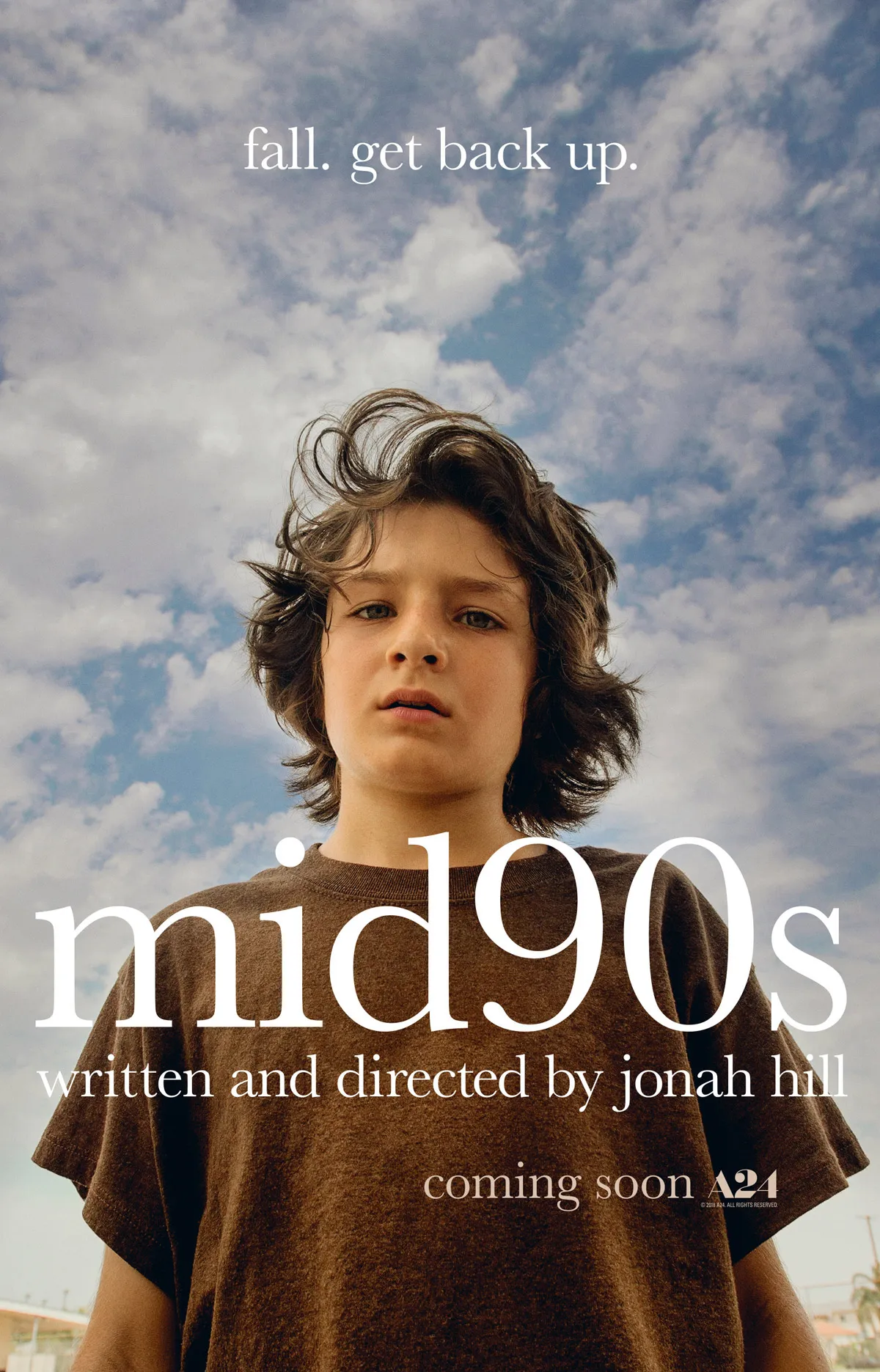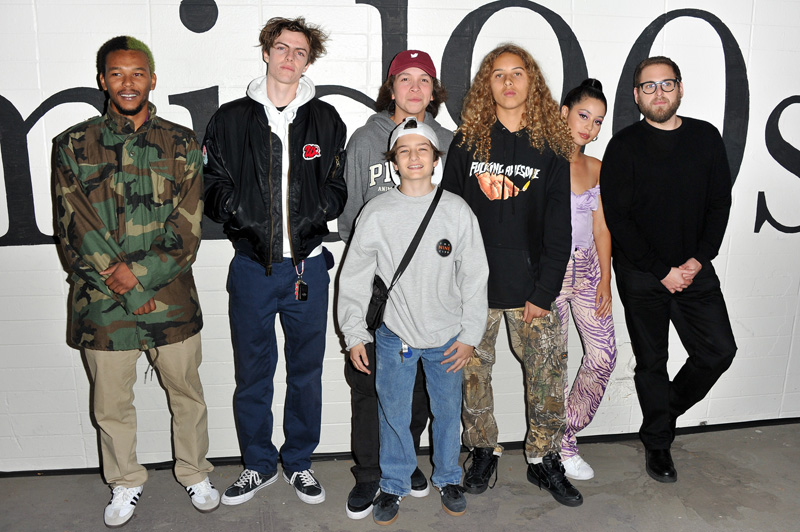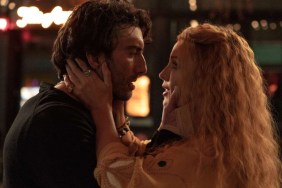Unless you’ve been living under a rock for the past ten years, you’ve probably heard of Jonah Hill. The star of such gems as Superbad, 21 Jump Street, Moneyball and The Wolf of Wall Street, Hill has always struck comedic gold, pumping life and authenticity into whatever project is lucky enough to be honored with his presence. However, little did the public know that Hill always longed to make the transition from starlight to storyteller, as a secret inner desire drove him to move behind the camera. Careful not to count his chickens, Hill waited patiently for the right time to make his voice known. Meticulously curating childhood memories and crafting them into a coming-of-age tale about growing up in the world of skateboarding, Hill can now say he’s finally made his directorial debut at age thirty-four with Mid90s, a heartfelt project buzzing with raw power which he can show to the world with pride.
In the film, a young outsider named Stevie – or ‘Sunburn’, as he is later dubbed by his peers – finds friends and a sense of belonging in the rough and tumble world of skateboarding in 1990s era Los Angeles. Stevie takes the hardest hits out of any kid around, both at home and at the skate park, but through his new hobby he finds the inclusiveness he’s always longed for, while simultaneously discovering that attitude that the sport inherits only gets you so far if you’re not being true to yourself first.
While at Fantastic Fest in Austin, Texas, ComingSoon.net was lucky enough to sit down with director Jonah Hill and the cast of Mid90s. In the interview, Hill discusses the need to cast real skateboarders for his vision, the challenges of being a first time filmmaker, and the joy he discovered in finding and honing his own unabashed voice – even if that means disregarding the advice of his peers.
RELATED: Fantastic Fest Review: Mid90s is Heartfelt, Buzzing with Defiant Energy
ComingSoon: I’m very curious about what made you want to tell this story. How does skateboarding act as a vehicle to tell a story about youth?
Jonah Hill: I grew up skateboarding in southern California in the mid ‘90s (laughs), but it’s not like bio pic or anything like that. It really provided me with ethic, and a point of view, and family outside of my home, and I guess it made me feel like I have this really unique perspective on growing up through skateboarding. It was just something that I always see kind of butchered onscreen, and it’s notoriously butchered. That felt like a great challenge, to sort of do that correctly, and put it up respectfully onscreen.
CS: How did A24 get involved with the project?
Hill: Very early, while I was writing. The first person I brought it to was Scott Rudin, and they had just made Ex Machina with A24, and I knew that’s who I wanted to release it. This was about four years ago, so it wasn’t the A24 that it is now, but I just thought that they were a really smart company and it was something that meant so much to me, I couldn’t have it at a big studio or something like that.
CS: It’s interesting that so much of your cast has never acted before. Why was it important to you to cast real skateboarders for your movie?
Hill: I think that’s kind of the problem with that movies that ever feature skateboarding, is they have actors and they try to teach them how to skateboard. I think the kids I grew up with, myself included, I felt were very charismatic, and skateboarding draws a certain kind of human being to it, someone who’s willing to fall and get back up over and over again. That sort of individualism as a group – to me, I’d way rather turn skateboarders into actors, than actors into skateboarders. I don’t think the reverse is possible. These kids were just so talented that it was clear to me they had it in them to become great actors if they wanted it, and the greatest part of this whole experience is watching them step up and take it so seriously and become such great actors.
CS: Ryder, Sunny, Olan, can you describe what your audition process was like for this movie?
Sunny Suljic: Well I – Hill: It’s not your turn. Not everything is about you all the time. [Sunny Suljic giggles, all the boys start laughing]
Ryder McLaughlin: I remember being really nervous at this one part where I’m supposed to ask to use Stevie’s bathroom. I just remember like shaking, but trying to use that as a way to ask the use the bathroom, as if like I really had to go. It was really fun though. It was really easy because Jonah’s a really nice dude.
Hill: Ryder came in, and he had it down. He did lean into his nerves, which is so appropriate for the character, but also not just like he was that person. He understood the beats of the scene. He worked really hard to become great. His character, Fourth Grade, says so little, but anchors a lot of the emotion of the film, and that’s a testament to his acting skill.
[Sunny Suljic looks to Jonah for approval]
Hill: Okay now you can go. You can say whatever you were gonna say. He’s like, ‘And then I came in, and I was best the best actor ever, of all time! I’m the greatest!’
[All the boys laugh uncontrollably]
Suljic: I don’t completely remember the audition, but one thing I do remember is the chemistry test, when Jonah had set his mind, but he just wanted to see all of us together. We all bonded pretty quickly. It was a quick connection. At that point, with the chemistry tests, it already felt like we were shooting the movie, so I was pretty nervous. It was like, I don’t really know why I was there.
Hill: Hm? Why you were there?
Suljic: Yeah.
Hill: Because you were great! Sunny was the first kid we read, I saw him at Stoner Skate, which is this local skate spot, and I just saw him and was like, ‘Oh yeah, that’s the guy’. I was looking for someone who is really small, who looked really young, but who is like ten feet tall inside. That’s Sunny. He doesn’t seem like a little kid. Like, we were laughing last night, I think only when he laughs so hard do you remember that he’s just a little ass kid, you know? He’s so mature. When you grow up skating, you’re eleven but you’re around eighteen, nineteen-year-old older kids, so you’re definitely seeing stuff beyond your years. Your sense of humor, your outlook is beyond your years. Like my nephew, who’s eleven, he’s around Sunny’s age but he doesn’t skate like he does, so he’s around other eleven year olds, so he feels like an eleven-year-old. I talk to Sunny, and we have conversations like I have with my friends. That’s a testament to skateboarding too, in a good way and a bad way, like the movie shows. You are ahead of your years, in some ways that are great, and in some ways that are like, ‘Okay, I could’ve slowed down a couple years’.
CS: What about you Olan?
Olan Prenatt: I initially went to where they were holding the casting process.
Hill: Yeah, our old production facility was so awesome, which we inherited from “Don’t Worry, He Won’t Get Far on Foot,” so it was Gus’ pre production place, and then we took it right over. We went into production right after that and it was amazing. It had this huge parking lot, everyone was skating outside, we just had this huge warehouse. (To the boys) Remember that place? [Boys all nod] And then the building got knocked down. Like the city is changing it, it was this shitty warehouse and now it’s going to be nice apartments or something. But it was epic, so we moved to Silverlake, but that was actually fun because we cut the whole movie on the porch. I didn’t go inside once. It was awesome. Remember that place? The porch?
Prenatt: I know what you’re talking about, yeah.
Hill: But Olan came into the old facility, and he was so good. He told us a story about using his girlfriend’s fake ID.
Prenatt: I got in!
Hill: It was so funny and he was so just enjoyable, I was like ‘Oh this is great! I found the last guy’. But then I sent it to Scott Rubin at A24 and he was like, ‘Uh are you going to have him read the lines?’ because I forgot to have him audition! I just loved him so much and was like, ‘I saw it!’ but then you forget as a director, a lot of what you do is explaining, like selling every little idea that you have, so I had to bring Olan back in to actually read the lines. Then when it came to cast him and Na-kel [Smith] I had to rewrite the parts for them. I had to look at what their strengths were, because Olan was so funny that I had to make the character a lot funnier because it would be a disservice to the movie to not have someone that lights it up like that.
CS: Directing is always a feat, but that’s especially the case your first time up at bat. How hard was it to get this movie made?
Hill: It was amazing. I mean, I miss it everyday, I look at pictures everyday, I took lots of photos on set. I miss it, I miss these guys, that’s why I love experiences like this. Even in Austin, just this experience. Like last night, we just got to all hang out, and we went and got dinner, and ice cream. Then I was going to sleep, and I’m not saying it was specifically anybody in this room, but I definitely heard possibly Gio and Sunny banging on my door and giggling outside the door, and I was like, ‘I’m in heaven’. You know? I’m thirty-four and my next movie is probably not going to be as magical. It might be magical, but it will be a different kind of magical. This is the greatest experience of my life. This is what I wanted my whole life, and I did it with people that I truly love. I love these guys, and now just even doing press, we get to all be together in a cool city and go eat barbeque and it’s amazing. It was a dream come true. To turn L.A. back into 1995 and have to recreate that, and all day every day everyone was just skating around me. For me, I had to keep it all together from a storytelling perspective, so it was definitely really challenging, but every time I’d look up from the war in my head I’d smile at the people I was around.
CS: You’ve always been someone who appreciates film in general, so when it came time to make your own project, what filmmakers did you look to for influence? I noticed that Harmony Korine makes an appearance in your movie.
Hill: I mean, I’m the luckiest person ever. I’ve been in the greatest film school for the past fifteen years and all of my professors have been everyone I’ve ever looked up to growing up. So, I’m the luckiest guy ever, and with this movie, I mean obviously Kids is one of my favorite films, and it’s an easy knock. I know when people saw the trailer they were like ‘Oh it’s just Kids’, and this film was made with such consideration and love and admiration of Kids, but it’s actually an anti Kids, because Kids is so beautiful, but it’s nihilism. My experience with skating growing up was filled with so much heart, and this movie is really emotional because it was about the people that I loved growing up, and it wasn’t about this nihilistic no future kind of thing. It was me trying to envision what a future would look like, as opposed to, ‘Fuck it, the world’s over after right this second’. I thought the perfect nod of respect would be to put Harmony [Korine] in the film somewhere, and he’s someone that who has been really generous with me, he read the script and gave great notes. I also thought, ‘Who is the last person in the world you would want to fuck your mom?’ and it’s Harmony, basically, so that’s why it’s just a funny person to have to do that. But also, to not make a big deal of it. It’s really fast. Shane Meadows, I love This is England, I showed the guys that movie before we started shooting as far as how a cast of young people act, where it doesn’t feel like actors, it doesn’t feel like a movie. It just feels hyper real and hyper raw and emotional. Elephant is a film that I love, and Chris Blauvelt my DP was a camera operator on that, he worked for Harris Savides for twenty years before he went out on his own. Also just a lot of skate videos, you know the movie is really a big expression of what I saw when I watched skate videos – they’re mostly skating, but then like three seconds of people just connecting, and I wanted to reverse that. I wanted to see what those three seconds were like as a skate video, just keeping the skating very minimal and textural.
CS: What did you learn about your voice as a filmmaker over the course of the project?
Hill: Just to be true to myself. It’s okay to have your own voice and your own opinion. I watched all of these amazing filmmakers have their own voice and it taught me that I was going to get nowhere by just biding by other people’s rules and that I had to have my own voice as a filmmaker. That’s why I waited until I was thirty-four, which seems young, but I’ve been doing this since I was eighteen, so I had a lot of opportunities beforehand and I waited until I had my own voice and wanted to figure that out. I watched a lot of people do it prematurely, and I would’ve just wound up biding someone else off. There was one filmmaker who I would say is a pretty artsy, well respected filmmaker that, there’s some self abuse stuff in Mid90s that’s pretty gnarly, and I remember he read the script, and he gave me some notes, and he said, ‘Good luck with that at the Arclight’. I remember being like, ‘Oh, I kinda don’t respect you anymore’. You know? Not like in a rude way, but that’s what makes this movie interesting to me, and that’s what makes me a filmmaker, is that I’m willing to do that in the middle of our movie, or have a five-minute scene where the kids connect with a homeless person. That’s what makes me a filmmaker, and that’s the kind of stuff I leaned into instead of running away from.
CS: Sunny, Olan, Ryder, I know that director Hill gifted each of you iPod playlists filled with ‘90s music. Since that music was a little before your time, were there any bands or songs that you’d never heard before that stood out to you?
Prenatt: Man, we heard a crazy song!
Hill: Which one?
McLaughlin: ‘Put It In Your Mouth’ by Akinyele!
Hill: Oh yeah! (Laughs) Do you know the Akinyele song ‘Put it in Your Mouth’?
CS: Nope.
Suljic: Oh my god that song! We learned that whole song. It was gonna be a scene, right?
Hill: We shot it, yeah. Okay, so we shot a whole scene of them rapping this song and we wound up not using it, but it was so popular with us when we were young, and it was so graphic. There’s also a woman’s verse where she tells the guy to…whatever, it’s a very sexual song. But yeah, I remember going in and telling the kids ‘I need you to memorize this entire song’.
Prenatt: And just scrolling through the iPod! Like before you told us to memorize it, just flipping through the iPod and finding that crazy ass song.
Hill: You noticed it before?
Prenatt: Well, yeah! (Laughs)
Hill: It’s a crazy song, but it was a classic when we were growing up because it was so graphic, and skate culture is so much about that. Now, punk and hip-hop is so mainstream and it’s so not punk to like it, but like, even from a filmmaking standpoint, we were super hyped on Pink Flamingos just because John Waters was so punk. The idea was that we were anti everything, so anything that was just provocative, or a middle finger, or kind of dark or out there, we were into, so that song we celebrated just because it was so uncomfortably graphic. And I didn’t even realize, because I was just so used to it, I put it on an iPod and gave it to an eleven-year-old and didn’t even think about it. Anyway, I’m going to jail so I’ll see you guys later. Write to me in my cell.
Mid90s
-
Mid90s











